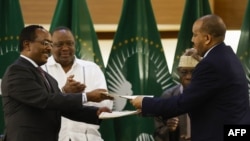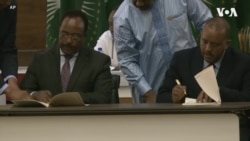"The two parties in the Ethiopian conflict have formally agreed to the cessation of hostilities as well as the systematic, orderly, smooth and coordinated disarmament," the African Union's special broker, former Nigerian president Olusegun Obasanjo, said.
The agreement marked a new "dawn" for Ethiopia, he said, speaking at a news conference.
"This moment is not the end of the peace process. Implementation of the peace agreement signed today is critical for its success," said Obasanjo, adding that this would be supervised and monitored by a high-level African Union panel.
He praised the process as an African solution to an African problem.
Tigray's rebels hailed the deal and said they had made "concessions."
"We are ready to implement and expedite this agreement," said the head of their delegation, Getachew Reda.
"In order to address the pains of our people, we have made concessions because we have to build trust."
"Ultimately, the fact that we have reached a point where we have now signed an agreement speaks volumes about the readiness on the part of the two sides to lay the past behind them to chart a new path of peace," said Reda.
(Disclaimer: No audio included on this part of the presser)
Following the announcement, Prime Minister Abiy Ahmed praised the deal in a statement.
"The agreement signed today in South Africa is monumental in moving Ethiopia forward on the path of the reforms we embarked upon four and a half years ago," Abiy said.
"Our commitment to peace remains steadfast. And our commitment to collaborating for the implementation of the agreement is equally strong," he said, thanking mediators for their role in negotiations.
United Nations Secretary-General Antonio Guterres on Wednesday hailed the announcement as a "welcome first step" in ending the conflict in the country's north.
"We're obviously going to be looking into the details but it is very much a welcome first step, which we hope can start to bring some solace to the millions of Ethiopian civilians that have really suffered during this conflict," U.N. spokesman Stephane Dujarric told reporters.
The United States also voiced its support for the agreement. State Department spokesperson Ned Price told reporters the move was “an important step towards peace” and the hailed the "extraordinary leadership" of African mediators.
Ethiopian and Tigrayan negotiators went to Pretoria last week for peace discussions sponsored by the AU.
The talks were first set to end on October 30, but were extended to today.
The Pretoria dialogue was launched in the face of rising international alarm over the resumption of combat in late August that ruptured a five-month truce.
Since the negotiations began, fierce fighting has continued in Tigray, where government troops backed by the Eritrean army and regional forces waged artillery bombardments and air strikes, capturing a string of towns from the rebels.
In an interview with Chinese state television broadcast on Monday, Abiy appeared to complain about foreign interference in the peace talks.
"Of course, if there are lots of interventions from left and right, it's very difficult," Abiy said. "Ethiopians should understand we can solve our own issues by ourselves."
Abiy also confirmed that Ethiopian forces and their allies had taken control of the Tigrayan towns of Shire, Axum and Adwa.
The international community has been pushing for a cessation of hostilities, humanitarian access to Tigray and a withdrawal of Eritrean forces, whose return to the conflict has raised fears of renewed atrocities against civilians.
This report was compiled using data from Reuters and Agence France-Presse.






